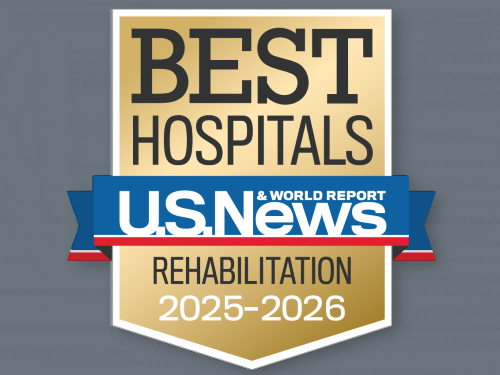The Texas Department of Health and Human Services recently awarded TIRR Memorial Hermann a nearly $200,000 grant to enhance workplace safety, reduce violence against nurses and improve care for brain injury patients.
 As one of the nation’s leading
rehabilitation and research hospitals,
TIRR Memorial Hermann has a
specialized neurobehavioral
program that treats brain injury
patients who exhibit “challenging
behaviors.” Lindsey Harik, PhD, a
neuropsychologist and program
manager, says these behaviors occur
in more than half of individuals who
sustain moderate to severe brain
injuries and can include both verbal
and physical aggression.
As one of the nation’s leading
rehabilitation and research hospitals,
TIRR Memorial Hermann has a
specialized neurobehavioral
program that treats brain injury
patients who exhibit “challenging
behaviors.” Lindsey Harik, PhD, a
neuropsychologist and program
manager, says these behaviors occur
in more than half of individuals who
sustain moderate to severe brain
injuries and can include both verbal
and physical aggression.
“The issue is a concern for the hospital because the demand for neurobehavioral care and therapy is growing rapidly,” Dr. Harik explains. “In fiscal year 2023 alone, there was a 166% increase in patient admissions to the program.”
Among the health care providers and staff who interact with brain injury patients, Dr. Harik says the nursing staff can be at risk for experiencing workplace violence because much of their work involves being in close physical proximity to patients and they work with patients for extended periods of time.
In addition to injuries, nurses frequently experience anxiety, emotional exhaustion and burnout that leads to increased turnover.
TIRR Memorial Hermann has diligently addressed the problem in recent years by taking a number of actions, including:
- Providing training and ongoing courses for nurses on brain injuries and patient behavior management.
- Creating dedicated care teams and treatment spaces for brain injury patients who demonstrate challenging behaviors.
- Establishing a special code that is broadcast throughout the hospital when a patient demonstrates challenging behaviors that involve imminent harm to themselves, staff, patients or visitors. The code prompts highly trained personnel to respond.
- Reviewing the latest medical research and literature on the topic at clinical meetings.
- Developing a behavioral rating tool designed specifically for monitoring brain-injury-related behaviors in the inpatient setting.
“Although these actions have been very beneficial, the grant will enable TIRR Memorial Hermann to further strengthen efforts to prevent or decrease workplace violence and improve nurse retention,” Dr. Harik emphasizes.
Specifically, the funding will be used to provide several staff members with more advanced training in techniques to manage brain injury patient behavior and de-escalate potentially volatile situations; they, in turn, can share the training with all nurses in the program.
“This will be an important additional step because research shows that when caregivers feel equipped to manage patient behavior, they in turn feel safer, less stressed, and have greater job satisfaction,” Dr. Harik notes. “The initiative will also benefit brain injury patients by preventing them from harming themselves and others, eliminating disruptions to their care and therapy and helping them achieve better outcomes.”
To measure the success of the training, hospital researchers will:
- Monitor incidents of workplace violence against nurses by brain injury patients.
- Survey nurses on a regular basis about their professional quality of life and psychological wellbeing.
- Track the turnover rate for nurses who work in the neurobehavioral program.
Results from the data sources will be studied to assess the long-term benefits of the additional education.
To date, little research has been performed on the subject in the national and international medical communities, according to Dr. Harik. “We hope our study will contribute to the body of evidence confirming the effectiveness of the techniques and assist in developing guidelines for health care organizations to reduce aggression against nurses by brain injury patients,” she says.
TIRR Memorial Hermann is eager to launch the new grant-funded training later this year to empower nurses to feel more confident and competent in managing challenging behaviors, Dr. Harik adds, noting, “We’re striving to provide the safest possible work environment so our nurses can thrive in helping brain injury patients maximize their recovery while experiencing dramatically less workplace violence.”
